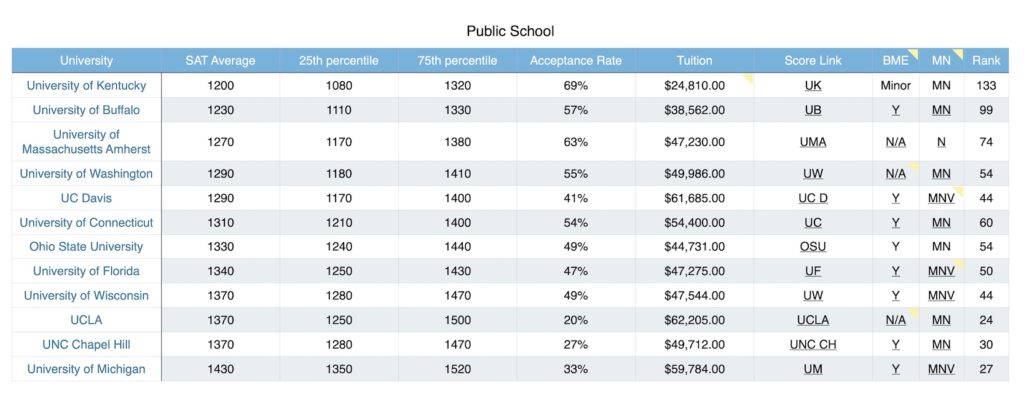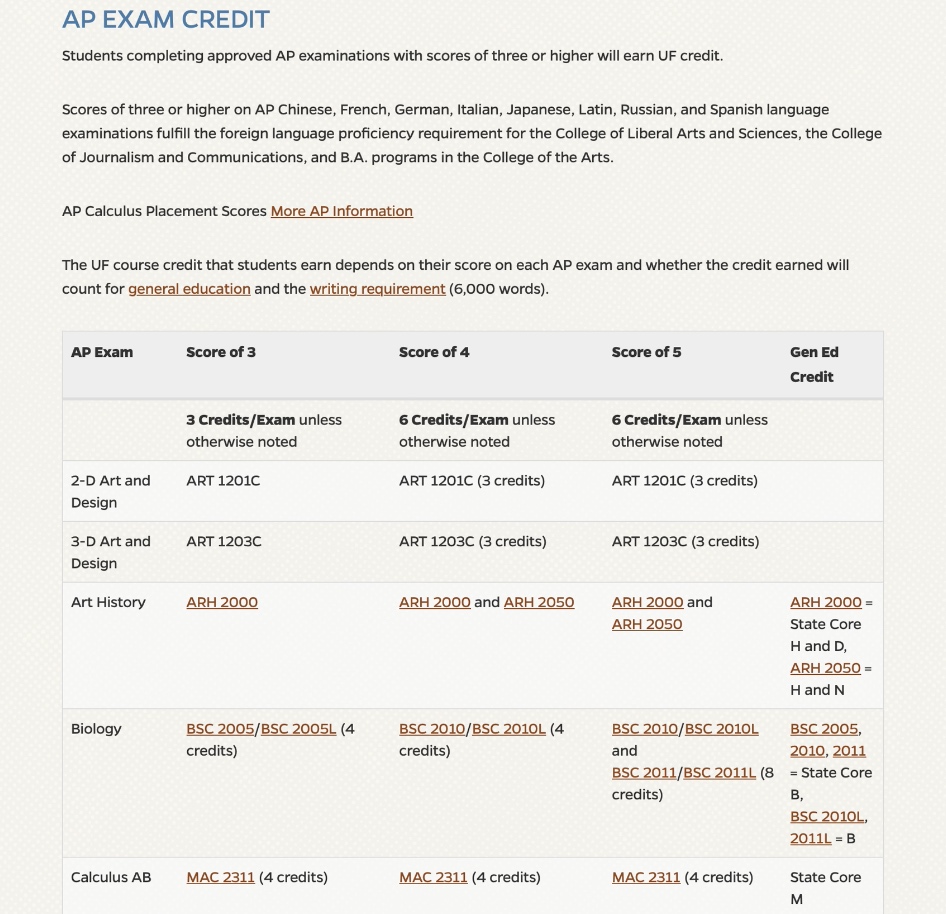Tips for Applying to College
06.04.2020 • 8 min read
How to pick the right ones
Many of you might have heard about the “tier system” when applying for college. There are typically three tiers: safe school, fit school, and reach school. The definition of each tier can be different for everybody. For me, safe schools are schools that I’m 100% sure I can get in. Fit range schools are the ones that I think I can get in, but I’m not quite sure If I’m there yet. And reach schools are the ones I have to work a little harder to get in.
To simplify this process, I made an excel sheet that had information like their SAT averages, their 25th percentile score, and 75th percentile score, their acceptance rate, and their tuition. I also noted the major they offer that I’m interested in. You can find all this information either from Google or on their official website. I would say when searching for majors, definitely look at the majors you want to apply for, but also don’t forget to explore some other majors you might be interested in, and see if the school has it or not. Therefore, when you want to add a minor or change your major in the future, you have more options.

Last but not least, it is also useful to check the ranking of the school. I know ranking is not everything. But it’s nice to have that information so that you can make an informed decision. So how does ranking help you? For me, I first checked their national rankings. I also checked the ranking within only public schools or private schools. Also, check the ranking for the program you want to apply for. For example, I wanted to apply for an engineering major, so I checked their ranking in both undergraduate and graduate engineering programs. That gave me a ballpark of how well the program is treated at the school. It showed me how much time and resources the school is willing to put into that program.
Why UF
After I got accepted to the University of Florida, I was really excited. And I wanted to come and see the school myself. So, my host family and I drove down from Kentucky and made a campus tour. That campus tour definitely showed me what the overall atmosphere of the school is like. Since we came in April, the school was still in session. We were able to see what student’s life is like. Seeing everyone running around on campus, I could feel that the school had energy in it. I also used that opportunity to visit their college of engineering undergraduate advising team and talked to some advisors as well as someone who was an engineering student himself. They were really kind and walked me through what the program is like. I would say if you have a chance to visit the campus, certainly tour the campus, but also don’t forget to use that opportunity to ask around, try to talk to the students, professors, and advisors.
To be honest, I really emphasized on UF’s rank. When I applied, UF was the top 8 public universities in the U.S. and about the top 30 something of all schools in the U.S. I would say ranking is not everything, but it’s worth looking into. There are many different factors the school was ranked higher or lower. Maybe some factors are not as relevant to you, for example, if a school is not good at sports, their ranking might be lower, but if you don’t care about sports, the ranking result would be skewed for you. It is important to look at the ranking, but don’t use it as the decision-making factor for you.
Also, Gainesville just has a lovely climate. I’ve never lived in the south. I was born in the northern part of China, and when I moved to the U.S., I lived in Kentucky. So I never lived in a place with palm trees and constantly warm weather, although it does rain a lot.
Another factor is UF’s tuition is really on the cheaper side for international students. With limited financial aid and scholarship, tuition can be critical in your decision-making process. Definitely think about how much the school costs and how much assistance you are able to get.
By the way, if you are an international student and are currently not in high school yet, do some research. If you go to high school in some states in America, such as Kentucky and Florida, for a certain amount of time, you are qualified for in-state tuition. This can be a huge money saver. If I knew I was going to come to UF, then coming to Florida for high school would be beneficial.

So what is the secret?
I wish I could tell you all the deepest and darkest secrets of the mindset behind the college admission process, but I would probably get deported due to fraudulent activities. All I can tell you is what I did in high school that enhanced my chances. Know that your mileage may vary. Of courses, you need to have a competitive GPA and exams score to get a foot in the door. I’m mainly going to talk about some factors aside from academic abilities.
For extracurricular activities, I’m going to talk about in-school and out-of-school activities. For in-school activities, I was in the student government in my junior and senior years. I was also in our school orchestra and beta club. I also tutor algebra for a really short while in junior year. For out-of-school activities, I volunteered at a local hospital for two summers. For the second summer, I got into a more selective program because schools want to see consistency. It shows your dedication, passion, and skills.
Now let’s talk about AP, IB, and Dual Enrollment classes. Since my school only offered AP classes, I can only speak to how AP is pretty beneficial. My advice is, if you’re available, definitely take as many as you can, because they do count for college credit. Although taking the test is about $100, it would still be way cheaper compared to college tuition. If you are not paying any tuition due to scholarship and government subsidies, AP credits can still be a huge time saver. Those credits gave me a head start in college. Since I took AP Calculus AB and BC, when I came to UF, I could go straight into Calculus 2 or even Calculus 3. AP classes can be pretty time consuming and work-intensive, but I would say it’s worth it.

One of the most important things people tend to overlook is recommendation letters. They can be extremely important. I picked people who I had a lot of interactions with. The more exposure you have to that teacher, the more they can know about you. That way, they can write not only about my academic achievement but also my work ethic, time management skills, and how I perform on a team. When you ask them to write you something, send a list of the schools that are interested in applying and a list of things that can remind them who you are. For example, what classes you did take with them, what did you do in that class, what did you learn from that class, and also your other accomplishments, your hobbies, your passion. Just put down something that can help them better learn who you are as a person. After they write it for you, make sure you send them a thank you note. A small gesture of kindness can go a long way.
Before you apply, try to gather as much information about your school as possible. It is nice to know things like academic performance, and student experience off-campus life. You are going to college to study, but you are also going to spend the rest four years of your life in that town. Make sure you like the climate and the location. Make sure you look at other things, not just the school.
And another important factor they look at is your essay. I wrote about my experience as an international student living with my host family. I’m not going to go into too much detail here, but I will tell you that I opened the essay with: “My host family opened their door to me, and their lives have never been the same.” And I ended the essay with: “Open your door to me, and your campus will never be the same.” I know, it’s very cheesy. What I’m trying to say is I can make a positive change on your campus. So, a tip for writing the essay: tell a story. The admission officers would sit in a room, reading essays all day, and they want to see something interesting. If you show them a story, they tend to be more intrigued, and they want to learn more about you. Through those stories, make sure you show your traits, strengths, and personalities. All your achievements and activities can be demonstrated via other parts of the application. The essay is the part where you show who you are as a person, your personalities, and your story.
A fun fact, the application said I could submit a resume. Back in high school had no idea what a resume is. So what I did was submitted a three pages long “resume” that had my entire life stories on it, including my favorite movies. Yeah, I know, I should’ve done some more research.

Here are some nice bonus ones. Work with your community. Take actions, make some impact. It is nice to have a high academic achievement; universities also want to know what you can bring to not only their campus but also the greater area of the whole community. Now let’s talk about leadership roles. I know it sometimes can feel like a popularity contest to either run for something or apply for something. It would be a nice plus if you have an active leadership role on campus. But there are many ways you can do that. You can either start a club, or you can just do something you’re passionate about. You can be an advocate of something, or you can try to educate your peers about a particular topic, or you can also lead something in your community. A leadership role doesn’t have to be tied with school activities. Just think about something you can do to engage other people actively.
Ultimately, the schools want to know what you can bring to their campus. Here is the last tip I have: your major does not equal to your career. Doing something like an exploratory or undecided major is ok. It even offers more flexibility and time to explore. It’s not fair to ask someone who is 17 or 18 to know what they want to do for the rest of their life.
What if I am an international student
There are some extra things you need to provide to the schools. They generally want a financial statement of some sort to either prove the source of funds for your tuition, or some kind of statement that shows the source of income or source of saving. I would say probably not all schools require it, but most of the schools I applied to did want that. Something else you might encounter is an international transcript. I did my 9th grade in China. The way the school structure worked in China is1st through 6th grade are elementary school, 7 through 9 are secondary or middle school, and 10, 11, 12 are high school. I came to the U.S. after I graduated from middle school, so I came in 10th grade. But in America, high school goes from 9th to 12th grade, so that’s why I need my 9th grade transcript. And you do need to translate that into English. Since I went to high school in the U.S., I would say I had fewer hoops to jump through. However, the schools I applied to still treated me as an international student applicant because there is certain paperwork they have to issue for us, such as the I-20. It’s a piece of paperwork that allows us to both enter and stay in the U.S. It’s extremely important. If you’re an international student, be sure to check with your school when you can get your I-20 because you need that to apply for U.S. Visa, and that can definitely take a while.
Conclusion
The one takeaway I want you to learn from this article is: ultimately, the school wants to know what you can bring to their university. And you can do that by showing your dedication, passion, and skills. Make sure you wrap those around in a beautiful story to make them intrigued and make them want you on their campus.
I hope this article was helpful. Good luck with your college application journey!
